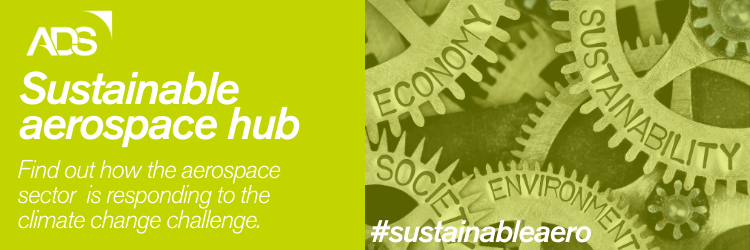
Sustainability has been a key topic at Farnborough International Airshow (FIA) Connect this year. Yesterday, Wednesday 14 July, FIA Connect hosted a panel of CTOs from Airbus, Boeing, GE Aviation, Raytheon, Rolls-Royce and Safran to discuss how aerospace is setting the agenda to reach net zero. The panel, hosted by Bloomberg’s Guy Johnson, set out the importance of sustainability within aerospace and the role that the global aerospace giants will have in decarbonisation.
A common theme on the panel was an appreciation of the size of the challenge facing aerospace, and that reaching net zero in aviation will require collaboration, partnerships, and a diverse mix of solutions. The last 40 years have seen huge advancements in the efficiency of aerospace technology, and the panel set out the next steps that they envisage will be required to decarbonize the industry.
One of the most promising immediate solutions is Sustainable Aviation Fuels (SAFs). The ambition in the industry was made clear; while SAFs represent a short-term solution, the immediate need is to scale up the production of SAFs globally. Both Airbus and Boeing reaffirmed their commitment for flights certified for 100% SAFs use, with Rolls-Royce, GE Aviation, Safran and Raytheon all demonstrating their commitment to working in partnership with aerospace and energy industries to ensure that the SAFs opportunity is maximised.
In addition to the opportunity represented by SAFs, the panel emphasised the possibilities and the technological advancements that are under way in developing more sustainable air frame and propulsion systems. These new technologies represent the future of flight in the medium to long term, and the aerospace industry is taking a collective and holistic approach to ensure that the technology can be developed as effectively and efficiently as possible.
It was clear from the panel that the global aerospace industry high ambition and determination to drive the sustainability agenda within aviation. Combined with the right policy and regulatory environment, a mixture of immediate short-term solutions and developing longer term technologies will enable the aerospace industry to decarbonise successfully and reach Net Zero by 2050.
On the panel were:
- Guy Johnson (Bloomberg, moderator)
- Sabine Klauke (Airbus)
- Naveed Hussain (Boeing)
- Chris Lorence (GE Aviation)
- Paul Stein (Rolls-Royce)
- Eric Dalbiès (Safran)
- Mark Russell (Raytheon)
ADS Sustainable Aerospace Hub
Reducing aviation’s impact on climate change will be a driving force behind the aerospace industry for the immediate and foreseeable future. Our Sustainable Aerospace Hub reflects the latest industry knowledge and insight.






